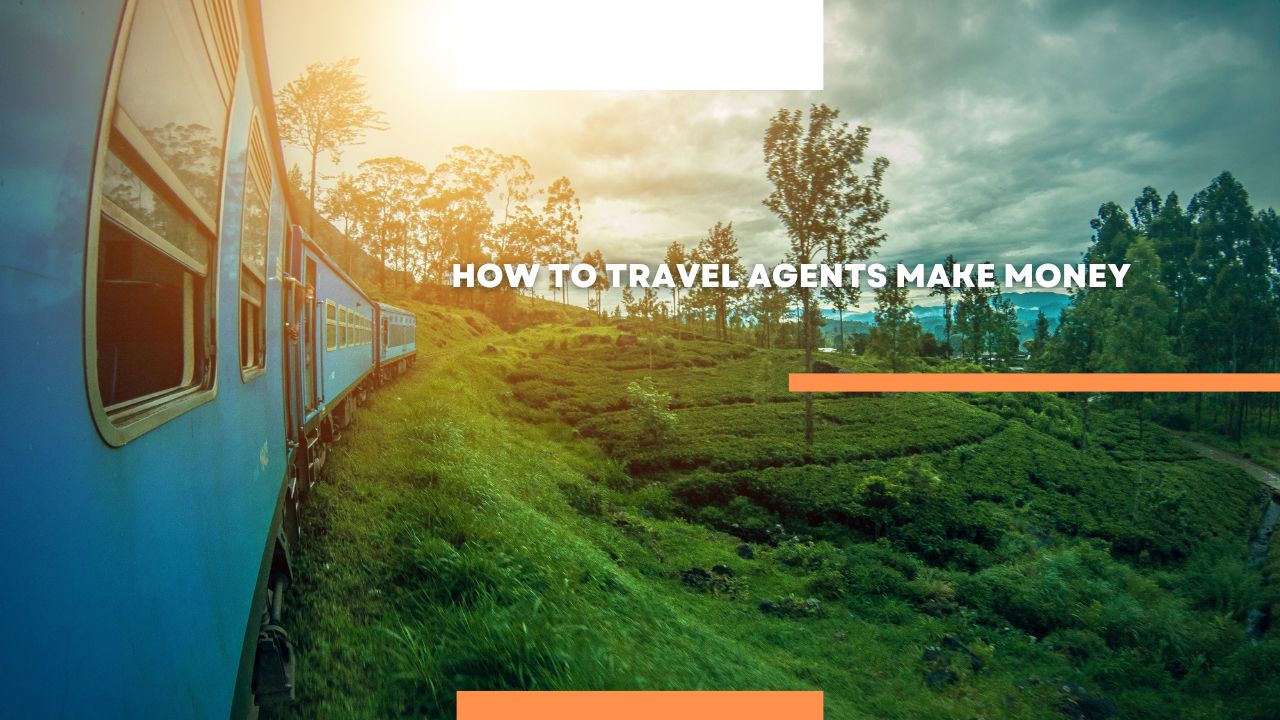Contents
Learn How to travel agents make money through commissions, service fees, and customized travel packages.
How to travel agents make money
Introduction
By assisting customers in understanding the complexities of booking travel and ensuring a consistent experience, travel planners play an important role in the travel industry. Regardless, have you anytime thought about how these specialists get their compensation? In the article titled “How Travel Planners Make Money,” we will examine the various sources of income that support travel planners’ strategies. Understanding these pay sources—customary commissions, support fees, and concentrated incentives—will shed light on how travel planners support their businesses and continue to provide important services to travelers worldwide. In the present unique travel scene, jump into the particulars to find out about the different ways that travel planners bring in cash.
Understanding the Revenue Streams of Travel Agents
Travel planners utilize a few techniques to bring in cash, each with its special qualities and suggestions for their business tasks. Here is a nitty gritty gander at the essential income streams:
Commissions
Overview
Commissions are travel agents’ primary source of income. A commission is regularly paid to a specialist for booking travel plans for a client’s sake, like flights, inns, travels, vehicle rentals, or travels. This is a portion of the total booking cost, which varies depending on the supplier and type of administration.
How Commissions Work
- Travel agents were traditionally compensated by airlines for ticket sales. Notwithstanding, numerous carriers have moved to a zero-commission model, particularly in North America. Instead, they frequently offer a commission only for certain programs or deals.
- Hotels: Hotels generally provide commissions ranging from 10% to 15% of the room rate. The exact percentage can vary based on the hotel’s location, the booking volume, and the agreement between the hotel and the travel agent.
- Voyage Lines: Journey lines offer travel planners commissions going from 10% to 16% of the voyage passage. Furthermore, voyage lines might give extra commissions to selling premium or extravagance journey bundles.
- Rental Cars: Typically, car rental companies charge commissions of between 5% and 10% on rental fees.
Examples and Table
Here is a simplified table showing potential commission rates for various travel services:
| Service | Typical Commission Rate |
|---|---|
| Airlines | 0% – 5% (varies by region) |
| Hotels | 10% – 15% |
| Cruises | 10% – 16% |
| Car Rentals | 5% – 10% |
Service Fees
Overview
Administration expenses are charged straightforwardly to clients for the travel planner’s aptitude and time. Personalized services like itinerary planning and booking modifications are covered by these fees.
Types of Service Fees
- Booking Expenses: Travel planners might charge a level charge for reserving travel spot. This can take care of the expense of time spent exploring and booking flights, lodgings, and other travel components.
- Consultation Fees: Agents may charge a fee for in-depth travel planning. Their expertise in tailor-made itinerary creation and travel advice is compensated for by this fee.
- Fees for Change and Cancellation: If customers need to change or cancel their reservations, agents may charge fees to handle these changes. This helps offset the regulatory exertion and likely punishments from specialist co-ops.
Examples and Table
Here’s a table showing common types of service fees:
| Fee Type | Description | Typical Amount |
|---|---|---|
| Booking Fee | Charged for making travel reservations | $25 – $100 |
| Consultation Fee | Charged for personalized travel planning and advice | $50 – $200 |
| Change/Cancellation Fee | Charged for modifications or cancellations of bookings | $50 – $150 |
Markups
Overview
Travel planners can procure extra pay by increasing the costs of movement bundles or administrations. Agents are able to generate additional revenue thanks to this markup, which is added to the base cost of the services provided by suppliers.
How Markups Work
- Package Markups: Travel agents frequently add a markup to the supplier’s cost when they create customized travel bundles or packages. This markup covers the specialist’s time and mastery in organizing the bundle.
- Service Markups: Agents may also mark up specific services, like tours or activities, especially if they’re booking exclusive or expensive experiences.
Examples and Table
Here’s a table illustrating potential markups:
| Service | Base Cost | Markup Percentage | Final Price |
|---|---|---|---|
| Vacation Package | $1,000 | 10% | $1,100 |
| Tour Activity | $200 | 15% | $230 |
Referral Fees
Overview
Reference expenses are installments gotten from outsider organizations when travel planners suggest their administrations. This can incorporate travel protection suppliers, nearby visit administrators, or other auxiliary administrations.
How Referral Fees Work
- Travel insurance: The insurance company may pay a referral fee to travel agents for each policy that they recommend to customers.
- Local Tours and Activities: Agents who recommend local tour and activity companies to their clients may be compensated for each booking made as a result of their recommendations.
Examples and Table
Here’s a table showing common referral fees:
| Service | Typical Referral Fee |
|---|---|
| Travel Insurance | $10 – $50 per policy |
| Local Tours/Activities | 5% – 10% of booking value |
Supplier Incentives
Overview
Suppliers frequently offer travel agents additional incentives for promoting particular products or booking particular volumes. Bonuses, rewards, or unique perks are examples of these incentives.
Types of Supplier Incentives
- Volume Rewards: Providers might offer money rewards or higher commissions in view of the volume of appointments made by a specialist.
- Promotional Rewards: Special rewards, such as gift cards or exclusive access to deals, may be offered to agents who promote particular products or travel packages.
Examples and Table
Here’s a table showing examples of supplier incentives:
| Incentive Type | Description | Typical Value |
|---|---|---|
| Volume Bonus | Cash bonus for reaching booking targets | $500 – $2,000 |
| Promotional Incentives | Gift cards or exclusive deals for promoting products | $50 – $500 |
Corporate Travel Management
Overview
Corporate travel the board includes dealing with movement courses of action for organizations, including flights, facilities, and schedules for workers. Travel agents may be able to make a lot of money from this avenue.
How Corporate Travel Management Works
- Account The executives: Travel planners might deal with all parts of corporate travel for a business, including booking, schedule the board, and cost detailing.
- Rates Negotiated: On behalf of corporate clients, agents frequently negotiate special rates and terms with suppliers, which can increase their earning potential.
Examples and Table
Here’s a table showing potential revenue from corporate travel management:
| Service | Description | Typical Fee |
|---|---|---|
| Corporate Account Management | Comprehensive travel management for a business | $2,000 – $10,000 annually |
| Negotiated Rates | Special rates and terms negotiated for clients | Varies by volume |
Preferred Partnerships
Overview
Favored associations include travel planners laying out associations with explicit providers or brands. As a trade-off for elite appointments or advancements, specialists might get better rates or extra commissions.
How Preferred Partnerships Work
- Select Arrangements: Specialists might gain admittance to elite arrangements or advancements that are just accessible through their favored accomplices.
- Improved Commissions: Travel planners could acquire higher commissions for appointments made through their favored accomplices, particularly assuming that they meet specific execution rules.
Examples and Table
Here’s a table illustrating potential benefits of preferred partnerships:
| Partnership Type | Benefit | Typical Value |
|---|---|---|
| Exclusive Deals | Access to special promotions and rates | Varies by partner |
| Enhanced Commissions | Higher commission rates for bookings | 5% – 10% higher |
FAQ
What is the most common way travel agents make money?
Travel planners most ordinarily bring in cash through commissions from aircrafts, lodgings, voyage lines, and other specialist organizations. This is an important source of their income.
Do travel agents still get commissions from airlines?
In numerous locales, carriers have created some distance from paying commissions straightforwardly to travel planners. All things being equal, specialists might get commissions through unique projects or limited time bargains.
How do service fees affect the cost of travel?
Administration expenses are extra charges that cover the travel planner’s time and mastery. These expenses are independent from the expense of the movement administrations themselves and are normally unveiled forthright.
Can travel agents charge for changes or cancellations?
When bookings are changed or canceled, travel agents may charge fees. These charges make up for the regulatory work included and possible punishments from specialist co-ops.
Are there special incentives for travel agents?
Yes, based on their performance and booking volume, suppliers frequently offer travel agents special incentives such as bonuses, promotional deals, or higher commissions.
Travel agents typically make money through several revenue streams:
- Commissions: Airlines, hotels, cruise lines, tour operators, and other businesses frequently pay travel agents commissions. At the point when they book travel plans for clients, these suppliers pay a level of the booking expense to the travel planner.
- Administration Expenses: Some travel planners charge administration charges for their skill and time. This can be a level charge, an hourly rate, or a level of the all out booking cost. These charges could cover things like schedule arranging, booking changes, or scratch-offs.
- Markups: Specialists might add a markup to the expense of movement bundles or administrations they book. This happens more frequently in custom itineraries and packages, where agents combine services and charge more than the base price.
- Reference Charges: Specialists could get reference expenses from different organizations or specialist co-ops they suggest, for example, travel insurance agency or specialty visit administrators.
- Provider Motivations: Once in a while, providers offer rewards or impetuses for booking a specific volume or arriving at explicit targets, which can add to a specialist’s profit.
- Corporate Travel The executives: For corporate travel, specialists might deal with complex courses of action for organizations and can get charges for dealing with these records and administrations.
By and large, a blend of these income streams can add to a travel planner’s pay, contingent upon their plan of action and the administrations they offer.
Conclusion
Taking everything into account, travel planners have enhanced revenue streams that assist with supporting their organizations and offer important types of assistance to voyagers. From commissions and administration charges to markups and reference expenses, these income sources permit specialists to offer master exhortation and customized travel arranging. Provider motivating forces, corporate travel the board, and favored associations further upgrade their procuring potential.


1 thought on “How to travel agents make money”